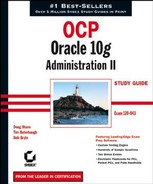3.9. Review Questions
Which of the following statements is true about non-critical losses?
Non-critical losses require media recovery.
Non-critical losses have a severe impact on database operations.
Non-critical losses can be resolved quickly with little impact to database operations.
Non-critical losses require the use of the RECOVER command.
Which of the following statements is true about temporary tablespaces?
Temporary tablespaces most often contain some permanent objects.
Temporary tablespaces are responsible for storing temporary or sort statements.
Temporary tablespaces must be recovered with the RECOVER command.
Temporary tablespaces cannot be managed locally.
Why is a missing tempfile considered a non-critical recovery situation?
The tempfile is dictionary managed and can only contain some permanent objects.
The tempfile is locally managed and can only contain some temporary objects.
The tempfile is locally managed and can only contain temporary objects.
The tempfile is dictionary managed and can only contain temporary objects.
How can you resolve a missing temporary tablespace quickly? (Choose all that apply.)
Recover the tablespace immediately because restoring is not needed.
Restore the tablespace from disk and not from tape.
Run CREATE TEMPORARY TABLESPACE and then ALTER DATABASE to the new temporary tablespace.
If a temporary tablespace exists, then run ALTER DATABASE to the existing temporary tablespace.
What must be done to recover a missing redo log file member?
First perform a ALTER DATABASE DROP LOGFILE MEMBER filename and then ALTER DATABASE ADD LOGFILE MEMBER filename on the missing logfile member.
Perform ALTER DATABASE ADD LOGFILE MEMBER filename on the missing logfile.
Nothing is required if you have multiplexed redo logs.
Nothing is required if you do not have multiplexed redo logs.
How would you know if you have lost a mirrored redo log member?
The database would hang.
The archive process would stop working.
The alert log would display an error, and the database would hang.
The alert log would display an error, and the database would process the archive logs.
What happens if the current or active online redo log group has a new member added?
Nothing, the redo log member will be added.
The redo log member will not be added because the log group is actively recording transactions.
The redo log member will be added, but it will be out of sync until a log switch occurs.
The redo log member will be added, but it will be empty.
What happens when you are recovering a temporary tablespace by switching to another available tablespace? (Choose all that apply.)
The new temporary tablespace is made available if the tablespace is permanent.
The new temporary tablespace is made available if the tablespace is temporary.
You will receive an ORA-12904 error if the available tablespace is temporary.
You will receive an ORA-12904 error if the available tablespace is permanent.
How can you rebuild the objects in the index tablespace most efficiently?
Recover the index from tape.
Rebuild the index with LOGGING.
Rebuild the index with NOLOGGING.
Rebuild the index in parallel with NOLOGGING.
What should be updated and readily accessible in case of a non-critical loss of a tablespace?
Temporary segments
SELECT statements using sorting
Current index scripts
Create table scripts
Which type of tablespace contains static data?
Read-only tablespace
Index tablespace
Read-write tablespace
Temporary tablespace
What is the result of starting an Oracle database with a missing read-only tablespace? (Choose two.)
The database opens normally.
The database only mounts.
An ORA-01157 cannot identify datafile halts the database from opening error occurs.
The database functions normally, and the read-only tablespace is static.
When connecting to an Oracle database locally to perform administrative functions, you are connecting with what access privilege?
SQL*Net
IPC
SYSDBA
SYSOPER
What is the proper way of creating a password supporting up to 10 users?
orapwd file=orapwORA101T password=syspass users=10
orapwd file=orapwORA101T password=syspass entry=10
orapwd file=orapwORA101T password=syspass entries=10
orapass file=orapwORA101T password=syspass entries=10
Which initialization parameter is required for remote access to the database?
REMOTE_LOGIN_PASSWORDFILE
BREMOTE_LOGIN_PASSWORD_FILE
REMOTE_PASSWORD_FILE
REMOTE_LOGIN_FILE
Which directory should the password file be stored in to function properly? (Choose all that apply.)
$ORACLE_HOME
$ORACLE_HOME/dbs
C:$ORACLE_HOMEdatabase
$ORACLE_SID
Before running the ORAPWD utility to generate a password file, what should be done?
Start the database but make sure it isn't open.
Start up the database.
Start up the database in MOUNT mode.
Shut down the database.
What do local connections to an Oracle database rely on for security and authentication of the user?
Password file
Database password
Operating system password
Listener password
The main reason that you need to restore and use the RECOVER command on a tablespace that was backed up read-write and converted to read-only is due to what? (Choose all that apply.)
The checkpointing process has changed the control file.
There have been changes to the tablespace.
The tablespace file header has been changed.
Read-only tablespaces require the RECOVER command.
Which situation is considered a non-critical loss to the database? (Choose all that apply.)
Loss of redo log group before archived
Loss of current or active redo member
Loss of archive log
Loss of current or active redo group
